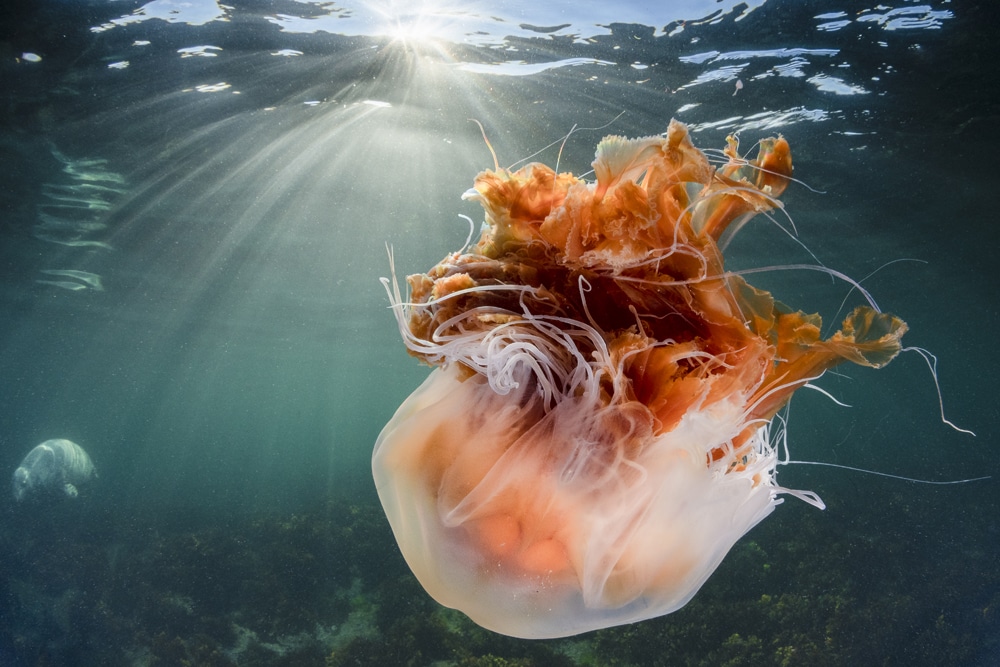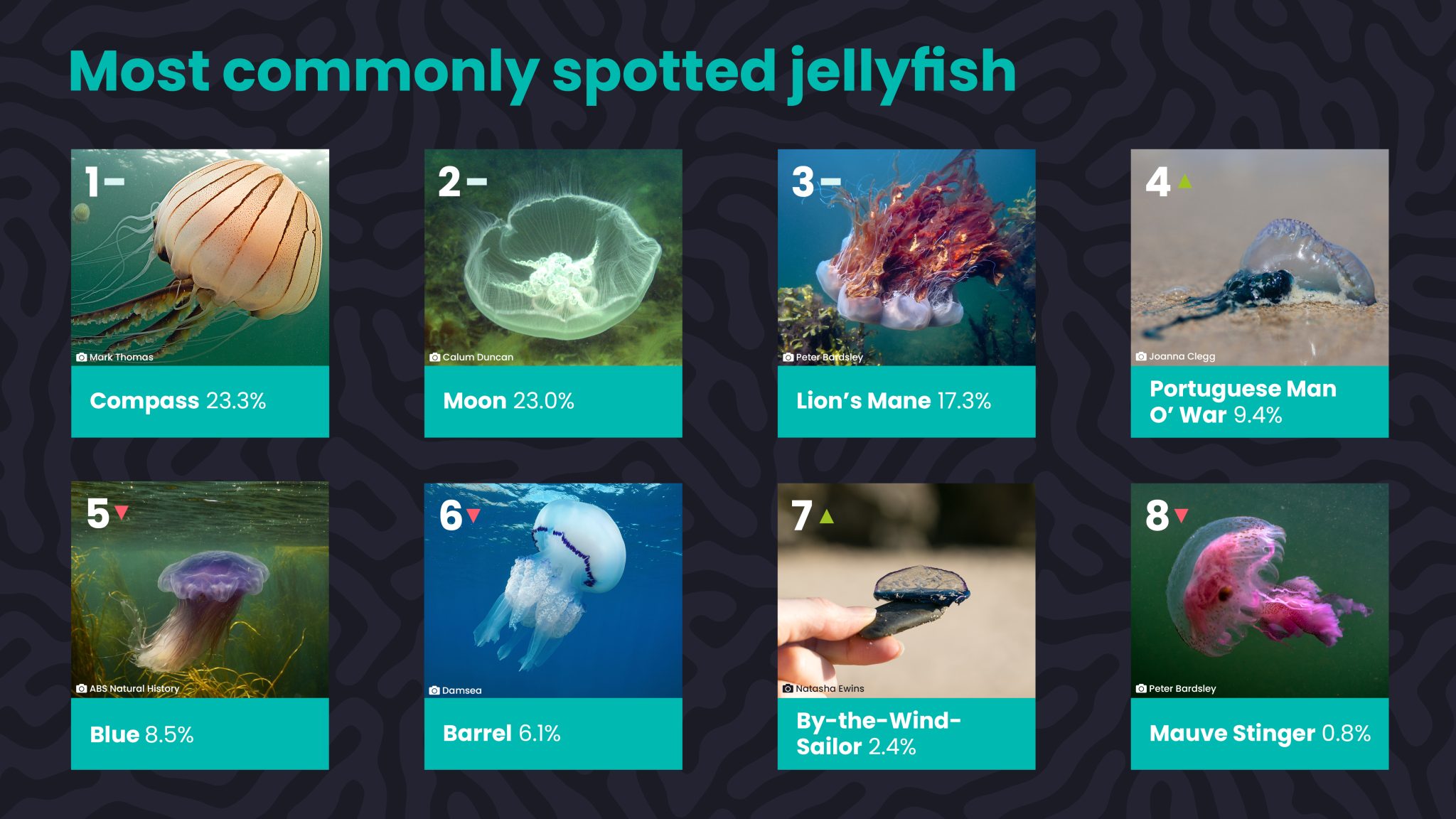Marine Life & Conservation
MCS want you to report jellyfish and turtles on our shores

 The Marine Conservation Society’s Wildlife Sightings programme focusses on two key marine animals: jellyfish and, as a result, turtles. Both are vital in supporting ocean biodiversity and are indicators of changes in our ocean, like warming waters.
The Marine Conservation Society’s Wildlife Sightings programme focusses on two key marine animals: jellyfish and, as a result, turtles. Both are vital in supporting ocean biodiversity and are indicators of changes in our ocean, like warming waters.
Since 2003, when the Marine Conservation Society’s Wildlife Sightings programme began, the charity has had 18,580 sightings reported – 18,357 of jellyfish and 223 of turtles.
Jellyfish can be spotted year-round in UK and Irish seas, but larger blooms are more likely to appear in spring, lasting through until autumn. Jellyfish sighting records from 2022 show that the most frequently reported jellyfish species were the moon jellyfish, accounting for 22% of sightings, followed by the barrel jellyfish at 21%. The compass jellyfish and lion’s mane jellyfish were also commonly sighted, comprising 19% and 15% of the reports, respectively. These findings provide valuable insights into the prevalence of jellyfish species in UK and Irish seas.
Sightings of jellyfish and turtles should be reported online when spotted by beach or sea goers to support ongoing research. Identification and reporting take just a few minutes using the charity’s easy identification cards and online form.
During spring and summer, jellyfish arrive in the UK and Ireland’s warming waters to feed, feasting on plankton blooms and the array of eggs and larvae of fish, crustaceans, starfish and molluscs which are common at this time of year.
With healthy fish stocks and rich biodiversity, jellyfish quickly become part of an effective food chain. Many species, from tuna to turtles, will feed on jellyfish of various sizes. Supported by a rich and diverse ocean ecosystem, jellyfish link the microscopic world of plankton to larger marine animals and the ocean around them.
The charity’s data shows an increasing trend in some species being spotted on our shores over the last 20 years, such as Portuguese man o’War. Research has suggested that an increase in some jellyfish numbers around UK could be related to climate change, however, currently there isn’t enough evidence to make this link. The Marine Conservation Society’s Wildlife Sightings programme aims to collect long term data which can be used as a reference to study the reality of jellyfish trends in UK waters.
Jellyfish are especially appealing for marine turtles to eat. Six of the world’s seven marine turtle species have been spotted in UK seas, some of which arrive due to large abundances of jellyfish in spring and summer. The charity also reported an increase in marine turtles earlier this year, when strong currents and winds potentially blew turtles off their usual course and into our seas. The charity has a Turtle Code information sheet which shows what to do with a beached turtle.
The largest sea turtle, and the most common in UK and Irish seas, is the leatherback, which has a ‘vulnerable’ conservation status. Reporting sightings of these incredible creatures will support the Marine Conservation Society and others in understanding their movements, potential threats and how better to protect them.
The charity’s volunteers submitted 223 turtle sightings since 2003, which feeds into a national database which recorded nearly 1,000 (946) turtle sightings over the same period. The research is used to inform policies and introduce conservation strategies to better protect our ocean and its inhabitants.
Dr Peter Richardson, Head of Ocean Recovery at the Marine Conservation Society, said:“Without your data, we wouldn’t be able to prove that our ocean is facing problems, or push for solutions that are backed by science. Data on jellyfish and turtles helps us build a picture of life in UK and Irish seas and track any changes that may occur because of things like climate change.
“Since 2003, when our Wildlife Sightings programme began, you’ve reported over 18,000 sightings of jellyfish and turtles. We want to reach 20,000 sightings to mark our 20th year of tracking these species. Every contribution to our database is crucial in learning about our seas and helps us fight to protect them.”
The Marine Conservation Society uses wildlife sightings by citizen scientists to:
- Discover how jellyfish and turtle populations are changing around the UK – specifically when and where they are occurring each year
- Investigate trends in turtle sightings to find out more about how they use our waters
- Explore whether jellyfish distribution can tell us more about where leatherback turtle feeding grounds may be
For more information on how to identify jellyfish and turtles, and to report a sighting, please visit the Marine Conservation Society’s website: www.mcsuk.org/sightings.
Blogs
Invitation from The Ocean Cleanup for San Francisco port call

6 years ago, The Ocean Cleanup set sail for the Great Pacific Garbage Patch with one goal: to develop the technology to be able to relegate the patch to the history books. On 6 September 2024, The Ocean Cleanup fleet returns to San Francisco bringing with it System 03 to announce the next phase of the cleanup of the Great Pacific Garbage Patch and to offer you a chance to view our cleanup system up-close and personal.
We look forward to seeing you there.
To confirm your presence, please RSVP to press@theoceancleanup.com
PROGRAM
Join The Ocean Cleanup as our two iconic ships and the extraction System 03 return to San Francisco, 6 years and over 100 extractions after we set sail, to create and validate the technology needed to rid the oceans of plastic.
Our founder and CEO, Boyan Slat, will announce the next steps for the cleanup of the Great Pacific Garbage Patch. Giving you a chance to view our cleanup system and the plastic extracted.
Hear important news on what’s next in the mission of The Ocean Cleanup as it seeks to make its mission of ridding the world’s oceans of plastic an achievable and realistic goal.
Interviews and vessel tours are available on request.
PRACTICALITIES
Date: September 6, 2024
Press conference: 12 pm (noon)
Location: The Exploratorium (Google Maps)
Pier 15 (Embarcadero at Green Street), San Francisco, CA
Parking: Visit The Exploratorium’s website for details.
RSVP: press@theoceancleanup.com
Video & photo material from several viewing spots around the bay
We look forward to seeing you there!
ABOUT THE OCEAN CLEANUP
The Ocean Cleanup is an international non-profit that develops and scales technologies to rid the world’s oceans of plastic. They aim to achieve this goal through a dual strategy: intercepting in rivers to stop the flow and cleaning up what has already accumulated in the ocean. For the latter, The Ocean Cleanup develops and deploys large-scale systems to efficiently concentrate the plastic for periodic removal. This plastic is tracked and traced to certify claims of origin when recycling it into new products. To curb the tide via rivers, The Ocean Cleanup has developed Interceptor™ Solutions to halt and extract riverine plastic before it reaches the ocean. As of June 2024, the non-profit has collected over 12 million kilograms (26.4 million pounds) of plastic from aquatic ecosystems around the world. Founded in 2013 by Boyan Slat, The Ocean Cleanup now employs a broadly multi-disciplined team of approximately 140. The foundation is headquartered in Rotterdam, the Netherlands, and opened its first regional office in Kuala Lumpur, Malaysia, in 2023.
Find out more about The Ocean Cleanup at www.theoceancleanup.com.
Marine Life & Conservation
SHARK MONTH ARRIVES AT ROYAL WILLIAM YARD, PLYMOUTH

A shark has been spotted approaching Royal William Yard in Plymouth, much to the surprise of swimmers, paddleboarders and onlookers.
With its distinctive dorsal fin cutting through the water, the sizeable shark swam along the coastline, before turning to head inland towards Firestone Arch at Royal William Yard. The appearance drew a crowd, who were captivated for more than an hour by the unusual sight – and it was all caught on video.
The shark is one of many expected sightings at Royal William Yard over the coming weeks… because today marks the start of Shark Month!
In reality, the ‘shark’ spotted along the Plymouth shoreline was actually a custom-made model, created by the team at Royal William Yard and sailed underwater by Caroline Robertson‑Brown from the Shark Trust, who donned scuba diving gear for the occasion.
The stunt took place to launch Shark Month in style and draw attention to the work of the leading international conservation charity, which is based in Britain’s Ocean City. Spectators were reassured that the water was safe and many entered into the spirit of the performance, swimming or sailing alongside the shark.
Shark Month will take place across Royal William Yard throughout July and will feature an extravaganza of art, entertainment and advocacy for everyone to enjoy. The packed programme of events starts with an art exhibition and ends with a trip on paddleboards with shark experts – with everything from a shark quiz to a Jaws screening in between.
Paul Cox, CEO of the Shark Trust, said: “There are often assumptions and misconceptions when it comes to sharks. This was certainly the case with the shark spotted at Royal William Yard! While the British coastline is home to many species of shark, this was not one of them. However, we’re thrilled it caught people’s attention, because seeing a shark is a special and memorable moment. That is precisely why we want to celebrate these incredible creatures, highlight the need for conservation, and ask for help to safeguard their future.”
For more information about Shark Month at Royal William Yard, visit the Shark Trust Website.
Images and video: Jay Stone
-

 Blogs2 months ago
Blogs2 months agoDiving With… Nico, Ocean Earth Travels, Indonesia
-

 News1 month ago
News1 month agoMurex Bangka Announce New Oceanfront Cottages & Beachfront Dining
-

 Blogs2 months ago
Blogs2 months agoA new idea in freediving from RAID
-

 Marine Life & Conservation1 month ago
Marine Life & Conservation1 month agoIceland issue millionaire whale hunter a licence to murder 128 vulnerable fin whales
-

 Marine Life & Conservation2 months ago
Marine Life & Conservation2 months agoThe Shark Trust Great Shark Snapshot is back
-

 News3 months ago
News3 months agoCharting New Waters; NovoScuba Goes Global with the Launch of their Revolutionary Dive Training Agency!
-

 Gear News1 month ago
Gear News1 month agoNew Suunto Ocean – a dive computer and GPS sports watch in one for adventures below and above the surface
-

 Marine Life & Conservation Blogs2 months ago
Marine Life & Conservation Blogs2 months agoBook Review: Plankton
















